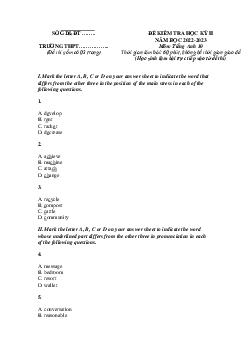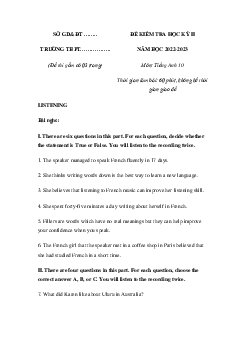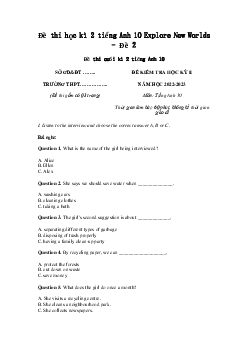



Preview text:
ĐỀ THI HỌC KÌ 2 LỚP 10 MÔN TIẾNG ANH
FRIENDS GLOBAL CÓ ĐÁP ÁN
Complete the sentences with the words below. There are two extra words.
baldness; deafness; discovery; invention; movement; reconstruction;
1. Martin’s father and grandfather haven’t got much hair. He says that ________________ has
always been a problem for men in his family.
2. Maybe the robot was the best ________________ of the 20th century.
3. Look, it’s working. You can see the ________________ of the cursor on the screen.
4. I think the first antibiotic was the greatest medical ________________ .
Complete the second conditional sentences. Use the correct form of the verbs in brackets.
1. If I ___________ (know) how to do these maths exercises, I ___________ (finish) my homework tonight.
2. If my brother ___________ (not be) a journalist, he ___________ (not meet) and write about famous people.
3. Jeremy ___________ (have) more money if he ___________ (work) part time.
4. My brother ___________ (not eat) at home very often if he ___________ (get) that job in the restaurant.
5. If you ___________ (buy) a better mobile phone, you ___________ (can) play lots of games on it.
Read the text and answer the questions.
INVENTIONS THE WORLD FORGOT The Telharmonium
The Telharmonium was the world's first electronic musical instrument. It was designed by
Thaddeus Cahill in 1897. Music from the instrument was broadcast to people's homes using a
telephone. Before the invention of the radio, people loved these first home concerts. After
Cahill's death in 1934, his brother kept one of the three models, but in 1962 it was destroyed.
No recordings of the music were kept, so the Telharmonium and its unique sound have disappeared forever. The Writing Ball
Invented in 1865 by Rasmus Malling-Hansen from Denmark, the Writing Ball was a machine
for typing onto paper. Its use of electricity made the movement faster. However, you could not
see the paper as you were typing. Nevertheless, the Writing Ball was very successful. Since
each model was made by hand, it was soon replaced by other cheaper machines produced in
factories. A new keyboard with a different key arrangement appeared. The once-popular Writing Ball was forgotten.
The Antikythera Mechanism
In 1901, parts of an ancient machine were discovered on a ship near the Greek island of
Antikythera. It had been made about 1,900 years earlier, in 2 BCE. For many years after its
discovery, nobody understood exactly what the machine was for. In the 1970s, scientists found
that this ancient computer had been designed to predict the movements of the sun, the moon and
the planets. It did this using more than thirty hand-made metal wheels of different sizes. The
remains of the Antikythera mechanism are now kept at the National Archaeological Museum in
Athens, together with a number of reconstructions to demonstrate how it may have worked.
1. What was the name of world's first electronic musical instrument?
__________________________________________________
2. What happened to the device in 1962?
__________________________________________________
3. When was the Writing Ball invented?
__________________________________________________
4. What was the Antikythera Mechanism used for?
__________________________________________________
5. Where are the remains of the Antikythera mechanism now?
__________________________________________________ ĐÁP ÁN
Complete the sentences with the words below. There are two extra words.
baldness; deafness; discovery; invention; movement; reconstruction;
1. Martin’s father and grandfather haven’t got much hair. He says that ____baldness_____ has
always been a problem for men in his family.
2. Maybe the robot was the best _________invention_______ of the 20th century.
3. Look, it’s working. You can see the ______movement______ of the cursor on the screen.
4. I think the first antibiotic was the greatest medical ____discovery_______ .
Complete the second conditional sentences. Use the correct form of the verbs in brackets.
1. If I ____knew______ (know) how to do these maths exercises, I _____would finish______ (finish) my homework tonight.
2. If my brother _____weren't______ (not be) a journalist, he _____would not meet______ (not
meet) and write about famous people.
3. Jeremy _______would have____ (have) more money if he _____worked ______ (work) part time.
4. My brother ___would not eat________ (not eat) at home very often if he _______got____
(get) that job in the restaurant.
5. If you ___bought________ (buy) a better mobile phone, you ____could_______ (can) play lots of games on it.
Read the text and answer the questions.
1. It was “The Telharmonium”. 2. It was destroyed. 3. It was invented in 1865.
4. It is used for predicting the movements of the sun, the moon and the planets.
5. They are now kept at the National Archaeological Museum in Athens.




